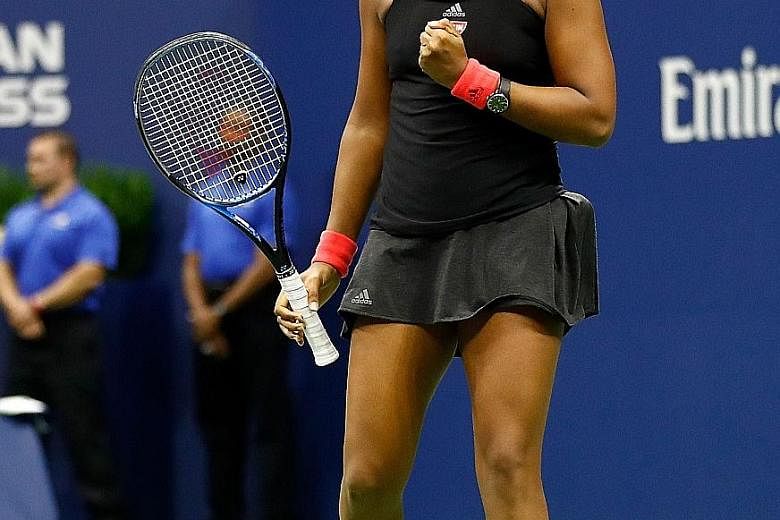NEW YORK • In an age of robotic press conferences where players are staying focused and taking it one match at a time, Naomi Osaka breezes in, confesses to being fond of sweating, eating 500 bagels a day and having only one friend.
It's all peppered with liberal doses of "likes", "you know" and "stuff". And it made her the breakout star of the 2018 US Open where on Saturday, she became the first Japanese to win a Grand Slam title with a 6-2, 6-4 win over childhood idol Serena Williams in a controversial final.
"Today I was thinking I have an amazing opportunity against one of the greatest players and I really shouldn't take this chance for granted. I should fight for everything and never get upset because that would be disrespectful."
Before the match, experts wondered if Osaka could handle the pressure of her maiden Grand Slam final, especially considering it was against Williams, who was gunning for a record-equalling 24th Grand Slam singles title in front of a partisan crowd. That the 20-year-old Japanese was able to not let the moment get the better of her is a testament to her mettle in high-pressure situations.
Osaka's power, speed and ability to shut out the distractions allowed her to prevail over Williams, but the match will long be remembered for the bizarre turn it took during the second set when the 23-time Grand Slam champion unleashed a furious rant at chair umpire Carlos Ramos.
Williams first disputed a warning for coaching, was given a point penalty for smashing a racket and then was handed a game violation after unleashing a torrid volley of abuse at Ramos, calling him a "liar and a thief".
Through it all, a laser-focused Osaka said she did not even notice the outbursts as she kept her eyes on the ultimate prize with a sense of coolness that was well beyond her years.
-
RISING STAR
-
2014
• Made first WTA main draw at the Silicon Valley Classic, reaching the second round.
2016
• Made her Grand Slam debut as a qualifier at the Australian Open, losing to Victoria Azarenka in the third round.
• Featured in the world's top 100 spots for the first time in April 2016 (and the top 50) later in the year.
• Named 2016 WTA "Newcomer of the Year" after making third-round appearances at three Grand Slams and reaching her first WTA final.
2018
• Won her first WTA title in March at Indian Wells, beating Russia's Daria Kasatkina in the final.
• Reached her career best ranking of 17th in July.
• Beat Serena Williams in the US Open final to become Japan's first Grand Slam champion and only the second Asian to win a Major after China's Li Na.
"I didn't know what was going on, I was just trying to focus. Since it was my first Grand Slam final, I did not want to get overwhelmed," said Osaka. "Serena came to the bench and told me she had a point penalty and, when she got the game penalty, I didn't know that either."
Osaka was not even two years old when Williams won the first of her six US Opens in 1999.
Born in - appropriately - Osaka, Japan, she was still two years away from moving to the United States on a permanent basis.
Her Haitian father Leonard met and married her mother Tamaki, having decamped to Japan from New York where he had studied.
Now based in Boca Raton, Florida, Osaka has dual Japanese-American citizenship. It is a status that could help explain what her coach Sascha Bajin describes as her innocence.
When Osaka performs media duties with her own national press, she takes questions in Japanese but replies in English, apologising for not knowing the appropriate word when she does resort to her mother tongue. Despite that, she is careful not to be seen as disrespectful.
"When you go to Japan, everything is totally awesome and you're having the time of your life," she said. "Every day you go out, you eat good food and stuff.
"When I go to Japan, I don't feel like I'm at home. I feel like it's a super awesome extended vacation that I don't want to leave."
Like Williams, Osaka has enjoyed a sibling rivalry although nowhere near as intense as Serena and her sister Venus.
Big sister Mari Osaka is also a professional who last week was playing on the second-tier circuit in Switzerland, losing in the quarter-finals of the US$60,000 (S$82,800) event.
Victory on Saturday earned Naomi US$3.8 million but she remembers the days when her older sister was the best player in the Osaka household.
"When I was practising with my dad, if my sister wasn't there, I don't think I would have made it," she said.
"She beat me 6-0 until I was 15, and then I don't know what happened but one day I beat her 6-2.
"I'm not sure if you call that a rivalry if someone beats you every day 6-0 for 15 years."
After Saturday, there will be no more arguments who is the better player in the Osaka household.

